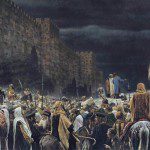
Lovely in limbs, and lovely in eyes not his
I spent a delightful couple of hours the other day watching a grandson compete in a gymnastics tournament. The grace and discipline he and others exhibited in tumbling and vaulting, front and back flips, and in an intricately choreographed final dance were not only impressive, but moving.
I loved the unabashed pleasure they took in what their young, lithe, healthy bodies could do. I thought of the line in Gerard Manley Hopkins’ poem “As Kingfishers Catch Fire” about how “each mortal thing” speaks itself by being clearly and fully itself, “Crying What I do is me: for that I came.” And then, a few lines later, the reminder of how we are, rightly, to see one another:
. . . for Christ plays in ten thousand places,
Lovely in limbs, and lovely in eyes not his
This was one of those ten thousand places. All beauty speaks of the source of all beauty. In each human act done with the whole heart and strength, selfless, self-expressing, self-fulfilling, there is, as the Quakers put it, “that of God.”
Hopkins’ lines led me to others I have loved in a poem by Richard Wilbur—a prayer to St. Lucy, patron of light, for the grace of seeing truly:
Charge me to see
In all bodies the beat of spirit,
Not merely in the tout en l’air
Or double pike with layout
But in the strong,
Shouldering gait of the legless man,
The calm walk of the blind young woman
Whose cane touches the curbstone
I thought of a severely disabled young woman in a course I taught who spent her waking hours in a wheelchair with a head brace and hand controls and breathed through a tube. When she spoke, between long draws from her oxygen tank, we listened; her luminous intelligence and her capacity for amusement despite all the obstacles she faced each day were as stirring as the grace of all those strong young bodies crying “What I do is me, for that I came.”
And I thought of the 90-year-old woman I met through hospice who died two days ago, at whose bedside it was my privilege to read or talk quietly about the tree outside her window, or pray or simply watch as she receded into a place I could not follow. Her patient going had its own grace and dignity, humbling to witness.
We bear witness to one another in ways we can’t, and need not, realize. We are bearers of a light no mirror lets us see. I wish we had a form of greeting more like those in some Asian traditions that mean I honor the light within you or The light in me bows to the light in you. If we heard that from one another more often, we might see even in the ordinary shuffling crowds and on street corners what shines, lovely, in limbs and eyes and laughter and in small acts of kindness or the simple gestures that may be remembered long after the grasped hand has been released, or the lifted burden laid down, or the hand, raised in welcome has turned to other purposes. We might see what is at play among us, in ten thousand places.
[Image courtesy of snappygoat.com]












